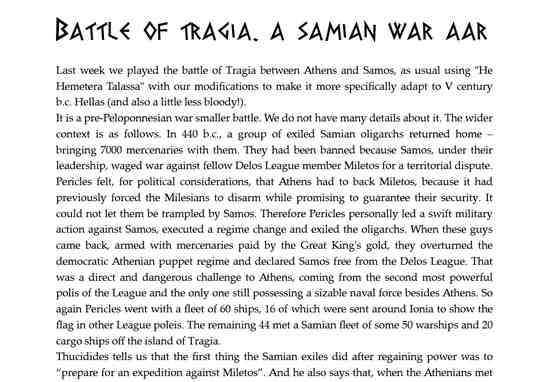
486 pages. No pictures. 14 maps. Notes, index, and books list.
TABLE OF CONTENTS
Acknowledgements
Foreword
INTRODUCTION - BEFORE HERODOTUS
a - The Near Eastern Background
b - The Greek Beginnings
PART 1 - HERODOTUS
1 - The Life and Works of Herodotus
2 - The Background and Beliefs of Herodotus
3 - The Methods of Herodotus
PART TWO - THUCYDIDES
4 - Thucydides and the Peloponnesian War
5 - Speeches and Personalities in Thucydides
6 - Power and Politics in Thucydides
7 - The Methods of Thucydides
PART 3 - THE LATER GREEKS
8 - Xenophon
9 - The Dramatic Historians
10 - Polybius
PART 4 - LATIN WRITERS OF THE REPUBLIC
11 - Cato the Censor and After
12 - Caesar
13 - Sallust
PART 5 - THE TWO FACES OF EMPIRE
14 - Livy
15 - Josephus
PART 6 - TACITUS
16 - Tacitus and the Empire
17 - Tacitus and the Emperors
18 - Anarchy and Humanity in Tacitus
PART 7 - GREEK AND LATIN BIOGRAPHERS
19 - Plutarch
20 - Suetonius
PART 8 - CHRISTIAN AND PAGAN
21 - Eusebius
22 - Ammianus
Epilogue - The Survival of the Ancient Historians
Chronological Table
Notes
Some Books on the Ancient Historians
Index
The wargamer with an interest in Ancients is often drawn to the primary sources - the surviving histories of Greek and Roman times. However, it can be hard for the non-scholar to know which of the historians are reliable.
Foreword (p.xiii):
This book is about the ancient Greek and Latin historians. That is to say, it is about the men who virtually invented the writing of history, by what seems at first sight to be a sort of miracle. On further investigation, it does turn out they had predecessors of a kind. Yet it still remains true that history, as we understand the term, is a Greek invention. The outstanding Greek historians, Herodotus and Thucydides, are writers of the same gigantic stature as their contemporaries the tragic poets; and they raised history at once to one of the supreme literary arts. It is advisedly described as an 'art', because the ancients maintained that history, to be worth the name, must not only be written as truthfully as human frailty permits, but must also be written well....
This book is a new edition of the late Michael Grant's 1970 book, providing a survey of the Greek and Roman historians (and biographers). It can be read as a primer on the historians, or used as a reference work when you need to know more about a particular source.
The Background and Beliefs of Herodotus (p.41):
The speeches quoted in the Histories of Herodotus are another profoundly Homeric feature. The great majority of ancient historians regarded such speeches as an important feature of their work. But they are a considerable stumbling block to the modern reader, who often reads them with a suspicion that no such speech was ever delivered, if, indeed, the occasion was accompanied by any speech-making at all; and, even if it was, the writer who provides the report possessed no means of knowing what had been said.
The author explains many of the features of the ancient records which puzzle modern readers. For instance, the books were intended to be read aloud (not silently); and the "speeches" were not only in the tradition of Homer's poetry, but allowed the author to present the point of view of historical participants.
Speeches and Personalities in Thucydides (pp.100-101):
Courage operates in the mass as well as in individuals. The psychology of masses and groups is a field in which Thucydides achieved extraordinary pioneer advances. With the acutest perceptiveness he analysed and expressed the changing attitudes of states, factions, councils, assemblies, and above all armies. Generals' speeches are skillfully adapted to the thoughts and feelings of their various contingents - unless it suits his purpose to do otherwise. The results of Greek battles depended on morale rather than tactics, and here we see the mentality of the soldiers, their excitements and exaltations and despairs....
The background of the historians, and the influence of their culture, is also brought out. Herodotus, for instance, respects the importance of oracles (prophecies); Thucydides, on the other hand, is skeptical about oracles, but does not discount their public influence.
One of the surprises is how ancient historians dealt with battles. According to Grant, the battle-pieces of most ancient writers are suspiciously unreal and repetitive.
The Methods of Thucydides (pp.119):
Perhaps Greek battles may have possessed a somewhat repetitive character. But Thucydides all too often leaves the purpose as well as the conduct of an engagement obscure and unexplained. This is partly because he only mentions military technicalities when they explain a general principle, or when a ruse or a mistake creates a dramatic situation; the dramatic and psychological elements are what he wants to emphasize. Another reason, however, and one which was appreciated by Herodotus and Tolstoy, was the fact that battles are obscure.
Also enlightening is the roll call of historians and histories that have been lost - some works known only by a title, or a paraphrase, or a quote in someone else's work. This book, while reminding us of the great service provided by the ancient historians, also shows us how fragile history is.
Reviewed by ![]() Editor in Chief Bill
Editor in Chief Bill ![]()
![]() .
.








